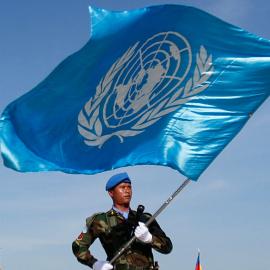To the Editor:
In trying to be hopeful and helpful, Michael Hirsh is far too bullish about regional peacekeeping and far too quick to dismiss the U.N. option ("Calling All Regio-Cops," November/December 2000).
His examples of "successful" U.N.-regional linkages are telling. The U.N. Security Council in fact had little to say during the Nigerian interventions in Liberia and Sierra Leone, and it was not about to authorize the NATO bombing in Kosovo and Serbia. Yes, Australia did get the council's backing for sending troops to East Timor, but Canberra would be reluctant to repeat that experience elsewhere in Indonesia or Southeast Asia. Nor did the Association of Southeast Asian Nations seek a larger security role in East Timor; ASEAN was AWOL during the crisis. The Middle East, South Asia, and Northeast Asia have no regional bodies to handle crises, and the Organization of African Unity and the Organization of American States (OAS) have spotty records in conflict resolution and almost no experience in peacekeeping.
Regional organizations lack the capacity for military intervention in part because they lack the will. The oas has always profoundly opposed the use of force, and ASEAN has neither the mandate nor the desire to take up security issues. Even mighty NATO hopes that Bosnia and Kosovo are the end, not the beginning, of its peacekeeping phase.
Besides, most developing countries see humanitarian intervention as a threat to sovereignty and territorial integrity. Even Nigeria, the star "regio-cop," lost much of its appetite for foreign military ventures when it turned democratic.
Hirsh concedes that control over regional interventions could be a problem, but he never explains what it means for the Security Council to "legitimate" the use of force when it cannot limit or monitor its application. Without forces on the ground, the U.N. could do little to ensure the observance of global norms. Nor does he address the implications for U.S. security interests of the emergence of regional hegemons, blessed by the U.N., in the vacuum left by the retreat of American power. His example of Chinese troops planting the U.N. flag in Cambodia is more than a little disquieting.
True, peacekeeping "is doomed to remain amateurish, late, and woefully under-resourced" when the powerful do not care enough to send the very best. But this is just as true on the regional level as on the global level.
The core problem is how those powerful nations, chiefly the United States, define their national interests. This can change with the political seasons. During the senior George Bush's single presidential term, the U.N. launched a record dozen peacekeeping and nation-building missions. Then, with a Democrat in the White House, a Republican Congress, and a few setbacks, enthusiasm quickly ebbed inside the Beltway -- although it has held up remarkably well in the rest of the country. Thus it is in the heartland, not in regional arrangements, that the solution lies.
EDWARD C. LUCK
Executive Director, Center for the Study of International Organization, New York University School of Law and the Woodrow Wilson School, Princeton University
